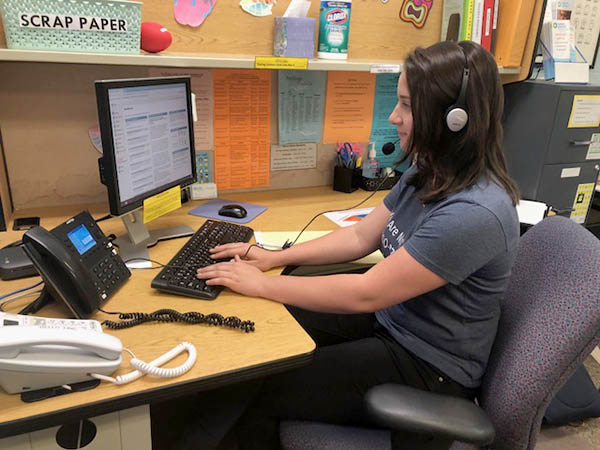Each year approximately 45,000 people die by suicide in the United States, 120 people each day, one person every 12 minutes. Though this tragically large number continues to increase annually, there is work being done to reverse this trajectory.
Caring Contact is an award-winning, volunteer-staffed crisis hotline and listening community. We compassionately serve those in emotional distress and educate our communities about the power of personal connection. In 2017, our volunteers responded to over 10,000 calls through our caring and crisis line. Contact Listeners are volunteers who listen to people in crisis over the phone. They receive 52 hours of listening and suicide awareness and intervention training before assisting people in need of support. Even after this rigorous training, most listeners are surprised by how volunteering transforms them. To give you a sense of their experience, here is an interview with a current Caring Contact volunteer listener (whose name is being withheld).
What is your professional background?
I am a recent college graduate. I studied Sociology and Psychology.
How would you describe your listening skills?
I would regard myself as a quiet listener. I know that probably sounds weird or maybe even obvious. But, after the training I realized how much talking I was doing when people were venting to me. Before I became a trained listener I don’t think I realized how powerful the act of listening can be or how difficult it is sometimes. I used to be distracted when listening to people and I missed a lot. Through the training I’ve attached a real purpose to listening and listening well, which has made me better in a variety of aspects in my life.
Tell me about your training.
The training struck this balance between easing the volunteers into the material and also challenging people in ways that were a bit nerve-racking. I remember my first practice session where I was acting as the Listener. All I was supposed to do was listen and reflect on a feeling or two. This, honestly, turned out to be one of the most difficult role plays because all I wanted to do was solve what seemed like an obvious problem to me, rather than just really listen to what the person was saying.
I found that the training applied to both the hotline and also my everyday life. I think everyone’s family members and friends are grateful when a person takes this training. I also loved the growth of each volunteer, it is so clearly visible because of the practice sessions and utilization of the skills we learned – there is a lot of development throughout those 12 weeks.
Do you ever feel like you get a call you can’t handle? How do you cope?
The first few crisis calls were really scary. I remember that I decided on those few phone calls to just be there and to sit with the person in this dark, dark hole. By the end of the call we had developed a safety plan and the person was safe in that moment. After these types of calls, I usually debrief with someone in the office or another volunteer who is working at the same time as me.
Also, there is a bell in the phone room which lets someone in the office know you need help. There was one instance when my phone call got disconnected because I was so shaken up and didn’t know what to do. Janet Sarkos, the Executive Director at Caring Contact and a volunteer listener, came in and talked me through the call. It’s things like that that make the overwhelming calls easier. It’s really helpful to be surrounded by people who have had similar calls, speaking to them is a huge way of coping for me.
What types of calls are most challenging?
Any call that involves someone being really down, feeling stuck and alone. Those are hard calls. They aren’t necessarily difficult to manage, but so many of these calls stick with me and I want to do more, to change their living situations and that’s just not possible. I think the most difficult calls are those that end before it seems like we have reached a safe plan, or have made enough progress – this has happened before and it’s really hard to let those calls go.
Which call was really memorable for you?
One of the most memorable calls was from a college student. We talked for about 45 minutes. He told me that he’s never told anyone the things that he’s told me during our phone call. He disclosed that if he had not picked up the phone and talked to me, that he was planning on running in front of a truck on the highway. Knowing that someone called and just by speaking to me for an hour felt like they could go on for one more day, that’s very powerful.
How did becoming a listener change you?
Being a listener has opened my eyes to how many people are struggling, how many people think about suicide but don’t tell those they are close to. I now feel comfortable asking those I am close to if they are struggling or thinking of suicide. That’s something I never would have done if it hadn’t been for this training and experience. I now know how powerful listening can be, just listening to another person. It can change their life.
Please visit our website, www.caringcontact.org, to find out more and how you can volunteer to save a life.

(above) A Caring Contact volunteer shares what she’s experienced on the suicide prevention and crisis hotline.

